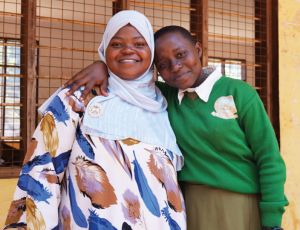
When she thrives, we all thrive
Together this giving season, we can make a difference that ripples outward to benefit everyone.
Fiona Mavhinga, CAMFED Association Executive Advisor Fellow delegates, good evening. I grew up in rural Zimbabwe, where 76% of our people suffer extreme poverty. I know first-hand what this means, subsistence living with no means of investing in the future, limited access to education for rural girls, denying them the chance to reach their potential and high unemployment trapping many rural young people in a vicious cycle.
In 1998, at 19, I joined forces with 400 rural female graduates in Zimbabwe, and launched the CAMFED Association – CAMA – to open up new opportunities for young women in rural Africa. Now there are 24,436 of us. Thank you. And that’s across five countries, and our membership continues to grow at speed.
Working together, we support female rural graduates to secure a living and become the next generation of African women leaders and entrepreneurs that are transforming their communities for the long-term. Rural young women face huge barriers to becoming successful entrepreneurs. Poverty isolates us. It limits our confidence. We lack financial skills. Without savings or collateral we cannot access traditional loans, so when starting businesses rural women are also particularly risk averse. Often resulting to already existing models of businesses in our communities, like the sale of dried fish, second hand clothes or groceries.
This does not help lift rural communities out of poverty, unlike community enterprises, which although riskier, can generate higher profit and stimulate growth. So how do we help young women overcome these barriers? This is what we do in our association. From a cascade model, we provide young rural women with financial and entrepreneurship training. In rural Ghana, we trained 30 women as core trainers, who passed on their knowledge to over 1,800 peer educators, and the peer educators in turn reached 135,000 community members with vital information.
Our simplified practice based entrepreneurship training developed with experts in the field equips young women with financial skills, encouraging them to start innovative businesses that address and meet community needs. We also monitor how these skills are taken up in our communities. Our Seed Money Program provides a non-repayable grant of about $100. Through that, young women learn to manage money, start a small business without the pressure to make repayments, and can grow their businesses to credit readiness. We promote peer support, encouraging giving back.
As CAMA (CAMFED Association) we are educated young rural women, and we share a deep commitment to develop our communities, multiplying the benefits of our education. Experienced entrepreneur members become trainers and peer mentors, providing support and two new entrepreneurs emerge and help others in turn. Through shared values, our entrepreneurs not only generate income for themselves, but benefit their entire community, especially the vulnerable.
Chuma grew up in rural Zambia in a family of subsistence farmers, her father died when she was only 10, her mother became too ill to carry on farming. Chuma almost dropped out of school. But a CAMFED bursary ensured she completed school. When she finished, Chuma joined our network, received training and an equivalent of $100 in seed money to start a successful rice farming business. Now, she is using her profit to pay school fees for two brothers, meet her mother’s medical costs and further her own education.
Chuma is one example of the 9702 entrepreneurs in our network. 93% of them make a profit, 86% spend their profits on themselves, their families and communities. In 2013 alone, our members supported over 63,000 children to stay in school. So as we discuss and look at entrepreneurship, let’s make sure that we not only help young people earn a living, but also bring agency, power and ownership to our communities. To the entrepreneurs here I say, help lift your communities out of poverty and contribute to change for the long-term. I thank you.
Margaret Monaghan $10.9
Helen Lea $157
Julia Thompson $100
Joan Goldfeder $211
Bonnie Riggins $10.9
Michael Higgins $13
Cheryl Johnson $5.6
Amy Casciano $10.9
Valerie Turner £40
joyce Davidson $16.1
FRANK BAUDINO $26.6
Markus Rockström €37.2
Chiara Starvaggi Cucuzza €37.2
Bonnie Hollrah $52.9
Karen Thomas $158